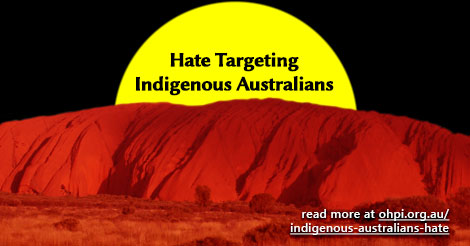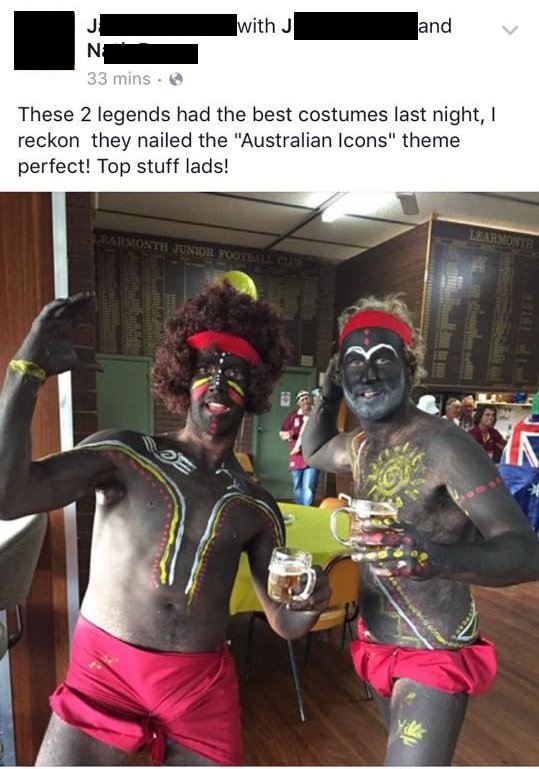Over the last few hours the picture below of what appears to be a couple of Indigenous Australians in traditional dress has been causing serious outrage on social media and started to be picked up by the news media.
The reason for this outrage is that neither of the people pictured are Indigenous, further, their dark skin colour in the photo has been painted on. Here is another picture of them:
Both the pair involves and the Football Club where this took place have been identified and named on social media. There are two issues here, one is the abuse of Indigenous culture, the other is the mob like persecution which follows. It is for this reason that the Online Hate Prevention Institute does not publicly name people.
The blackface problem
These pictures are from an “Aussie Icon” themed party at the Learmonth Football Club in country Victoria (near Ballarat). The “blackface” tradition goes back to an America theatre tradition starting in the 1830s and which ran for over a hundred years. Performers would blacken their faces to act the part of African-Americans. The roles that were played in blackface were typically racist stereotypes. Today it is considered a form of appropriation of another people’s culture and exploitation of that culture.
The Learmonth Football Club supports the Victorian Code of Conduct for Community Sport. This includes a requirement that all people involved show respect “towards others, the club and the broader community”. It also promotes “inclusion of every person regardless of their race, culture or religion”. It is unclear whether this was a club event or a private event at the club, either way, this should not have happened.
Given the theme was “Australian Icons”, in this case the effort to portray Indigenous Australians was not to denigrate them, but to highlight Indigenous Australians as Aussie icons. It was clearly intended to show respect, not disrespect. This is still a mistake, but one likely made through ignorance rather than intent.
There have been similar recent cases of blackface in Australia, including one at the Australian Open where a Tennis fan dressed up in blackface as Serena Williams. The fan was seeking to support her. US commentators have seen both the dressing up in blackface and the lack of response from those around her as evidence of a high degree of racism in Australia. In truth it is evidence of a high degree of ignorance of a history of largely American and later British racism. As Australians we need to learn that this form of dress up has a racist history and should be avoided.
In general it is considered offensive to dress up as a member of a minority group as such dress up typically relies on conforming to easily recognisable stereotypes. In the case of the party, an Aboriginal flag would have been sufficient to make the point in a non-offensive manner.
The backlash problem
Social media can take an issue viral incredibly quickly. An anonymous wrong doer can be tracked down and the evidence posted and reposted going viral. Those participating in “the hunt” gain a sense of shared purpose, and may feel they are acting on the side of the angels. Unfortunately such online mobs can easily do great harm
Dr Andre Oboler, CEO of the Online Hate Prevention Institute explains, “A person may have done something very wrong, but often the response of the online mob knows no limits and can lead to even greater harm. In extreme cases this can lead to attacks on individuals or to serious harassment which leading to self harm or suicide.”
Added to this the harm to those wrong identified, either by mistake, or when a troll impersonates a real person when engaging in the activities that set off the mob in the first place.
The Online Hate Prevention Institute encourages people to avoid escalating mob situations. In a situation like the football club’s, the club will be quite capable of responding appropriately. One appropriate response would be to arrange a meeting between those responsible and members of the Indigenous community. This would not only provide a forum for an apology for the offence caused, even if it was not intended, but also an opportunity for winder discussion and education.
The Online Hate Prevention Institute’s reports are released for free to increase their impact. The work is made possible by public donations, you can donate to help support this vital work. You can also support OHPI on our Facebook page and stay updated by joining our mailing list.



